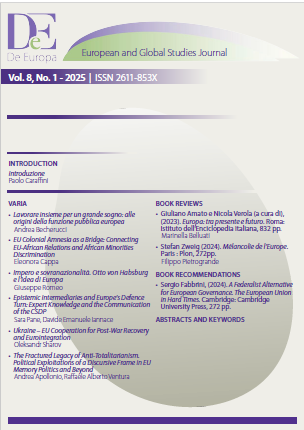EU Colonial Amnesia as a Bridge: Connecting EU-African Relations and African Minorities Discrimination
DOI:
https://doi.org/10.13135/2611-853X/12369Abstract
This article investigates the role of the lack of historical memory of colonialism in shaping relations between the European Union (EU) and Sub-Saharan Africa. In this regard, an internal and an international perspective have been brought together, as an analysis of the impact of the lingering colonial culture on minority discrimination within the EU should also consider the development of reciprocal relations on a foreign level.
Methodologically, African-origin immigration towards the EU and the protection of fundamental human rights within and beyond European borders served as two concrete examples to explore this interconnection. In both instances, the concerns affecting domestic dynamics were also the most disputed between African and European representatives during international negotiations throughout different frameworks and decades.
On the one hand, the continuous sources of conflict that overcome economic and strategic interests in the dialogue between the European Union and African countries have made it necessary to address the underlying causes of racism and persisting mutual stereotypes. Indeed, different views on migration management and human rights protection hinder an equal dialogue between Europe and Africa, unveiling divisions that cannot be solved through pragmatic solutions. Besides, on the internal level, the resurgence of racist incidents in European cities and the ideological turn that speeches take when dealing with African-origin minorities shows the need to reflect upon the long-term obstacles lying behind reciprocal misunderstandings.



 The journal has been approved for inclusion in DOAJ. The DOAJ listing of the journal is available at
The journal has been approved for inclusion in DOAJ. The DOAJ listing of the journal is available at 

